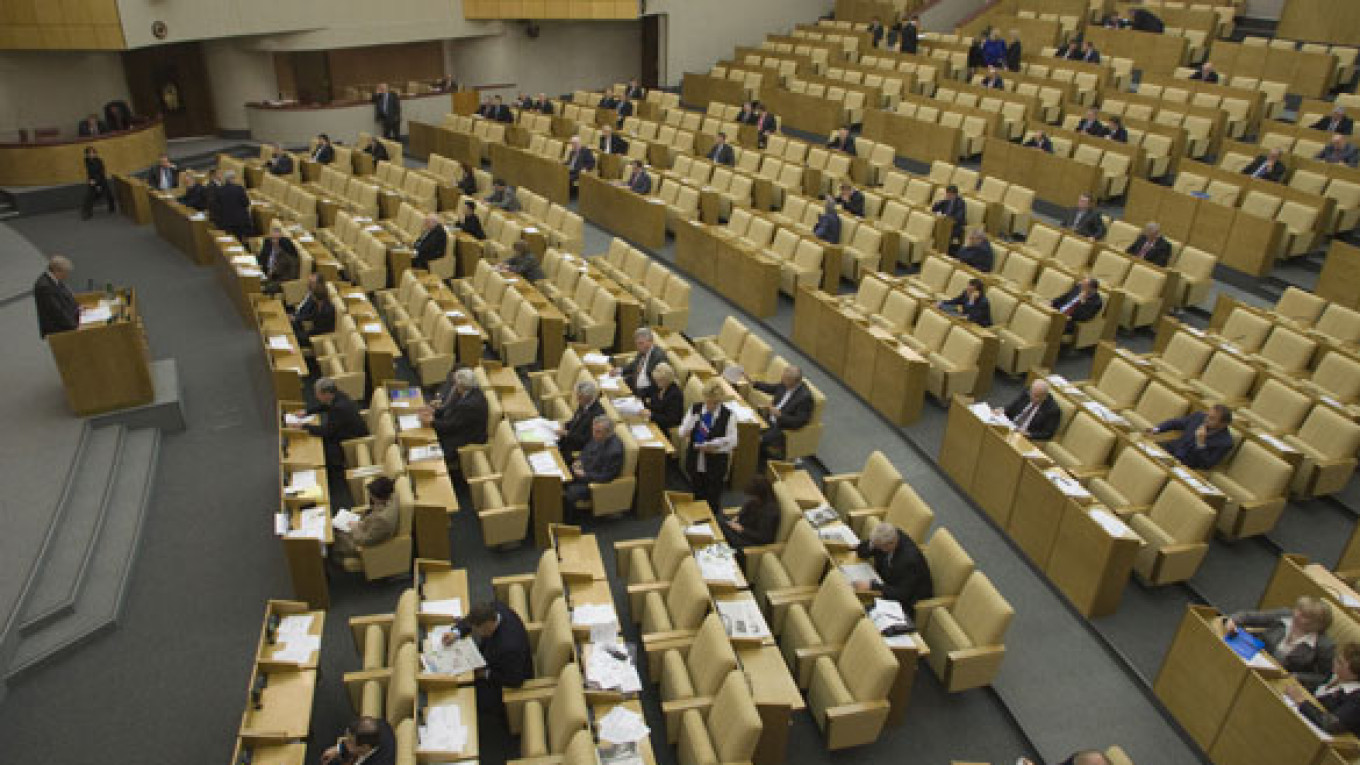The State Duma will not punish lawmakers who skip parliamentary sessions, despite a recent investigation that found that one-quarter of all deputies and senators are regular absentees.
Pavel Krasheninnikov, chairman of the Duma's Legislation Committee, said Thursday that a Public Chamber proposal to introduce legal sanctions for lazy lawmakers would be unconstitutional.
“The Constitution says the Duma's work is governed by its own rules, not by federal law. Let the Public Chamber read the Constitution,” Krasheninnikov, a member of the ruling United Russia party, told RIA-Novosti.
The chamber, an advisory body created in 2005, prepared a list of members of both houses of parliament who are regularly absent.
The list, said to contain about 100 deputies and senators, should have been published this week, but the chamber said Thursday that it decided against doing so.
Public Chamber member Iosif Diskin said the reversal was done out of fear that the list would be used to single out individual deputies and not to change the system as a whole.
“It would be like skimming the cream from milk: Nobody is going to publish this list in full, and some rich people might even try to block the publication of their names,” Diskin, a member of the chamber's working group that investigated the issue, told The Moscow Times.
He denied reports, however, that the Kremlin had attempted to suppress the list. “All of this is rubbish. I had the impression that the [Kremlin's] reaction was the opposite,” he said.
But the list has already been leaked to national media, which published several names of Kremlin-connected politicians.
The dubious title of the worst slackers go to Senators Sergei Pugachyov and Lyudmila Narusova, who both represent the remote Siberian republic of Tuva in the upper house of parliament, Noviye Izvestia reported earlier this week.
Pugachyov is a billionaire banker said to enjoy close Kremlin ties, while Narusova is the widow of former St. Petersburg Mayor Anatoly Sobchak, a patron of Prime Minister Vladimir Putin.
President Dmitry Medvedev in April lashed out at absentee lawmakers, calling their behavior “insulting” for voters, and demanded legislation that ensures the dismissal of the worst offenders.
Diskin, who is a deputy head of the Institute of National Strategy, a think tank, said the Public Chamber had proposed exactly such a law and that he was sure that the Kremlin would act swiftly. ?
He argued that the list contained many wealthy lawmakers, raising the question to them: "Did you enter the Duma just to get immunity [from prosecution] or just for a PR stunt?” he said.
The list contains United Russia Deputy Andrei Skoch and Federation Council Senator Suleiman Kerimov, both billionaires who appear on this year's rich list of Russian Forbes, Vedomosti reported.
Skoch, who represents the Belgorod region, defended his work by telling the newspaper that a deputy "should work with the people in his region and not sit on his butt all day in his Moscow office."
The problem came to the fore last week when Ren-TV showed deputies running through empty rows in the 450-seat Duma punching voting buttons for absent colleagues. The footage apparently showed the successful passing of a new drunk driving law with 449 votes, while just 88 deputies were present.
But Nikolai Levichev, head of A Just Russia's Duma faction, defended the practice.
“If a person votes on request from another deputy with that deputy's consent, I do not see a problem," he told The Moscow Times.
He added that his faction has suggested using electronic fingerprints to ensure that only attending lawmakers can vote.
But Levichev admitted that the Duma's overall role was unsatisfactory.
“Parliamentary work does not depended on lawmakers' impressive speeches, because decisions are made inside United Russia’s faction,” he said.
A Message from The Moscow Times:
Dear readers,
We are facing unprecedented challenges. Russia's Prosecutor General's Office has designated The Moscow Times as an "undesirable" organization, criminalizing our work and putting our staff at risk of prosecution. This follows our earlier unjust labeling as a "foreign agent."
These actions are direct attempts to silence independent journalism in Russia. The authorities claim our work "discredits the decisions of the Russian leadership." We see things differently: we strive to provide accurate, unbiased reporting on Russia.
We, the journalists of The Moscow Times, refuse to be silenced. But to continue our work, we need your help.
Your support, no matter how small, makes a world of difference. If you can, please support us monthly starting from just $2. It's quick to set up, and every contribution makes a significant impact.
By supporting The Moscow Times, you're defending open, independent journalism in the face of repression. Thank you for standing with us.
Remind me later.


